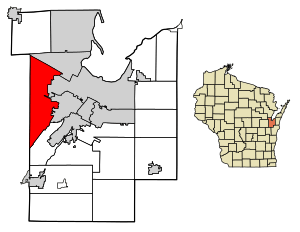Hobart, Wisconsin facts for kids
Quick facts for kids
Hobart
|
|
|---|---|
| Hobart, Wisconsin | |

Location of Hobart in Brown County, Wisconsin.
|
|
| Country | |
| State | |
| County | Brown |
| Area | |
| • Total | 33.14 sq mi (85.83 km2) |
| • Land | 33.02 sq mi (85.53 km2) |
| • Water | 0.12 sq mi (0.31 km2) |
| Elevation | 682 ft (208 m) |
| Population
(2020)
|
|
| • Total | 10,211 |
| Time zone | UTC-6 (Central (CST)) |
| • Summer (DST) | UTC-5 (CDT) |
| Area code(s) | 920 |
| FIPS code | 55-35150 |
| GNIS feature ID | 1583399 |
Hobart is a village located in Brown County, in the state of Wisconsin in the United States. In 2020, about 10,211 people lived there. Hobart is part of the larger Green Bay area. The village is completely inside the land that belongs to the Oneida Nation of Wisconsin by treaty.
Contents
History of Hobart
The area known as Hobart officially became a village on May 13, 2002. It was named after John Henry Hobart, who was an Episcopal Bishop from New York. He sent missionaries to help the Oneida people and supported them when they moved from New York to Wisconsin.
Hobart and the Oneida Nation
Hobart's local government has had several disagreements with the Oneida Nation of Wisconsin. These disagreements are about who has authority over the land within the reservation where Hobart is located.
In 2008, a judge supported rules made by the Village of Hobart. These rules aimed to stop certain reservation lands from becoming part of the Oneida Nation's special trust land.
Later, in 2010, the village did not give a business owned by the Oneida Nation a permit. The village said the tribe had not paid certain fees for their land. The Oneida Nation argued that the village did not have the right to charge these fees on their trust land. A federal court decided in favor of the Oneida Nation. The village tried to appeal this decision, but the highest court in the U.S. did not take the case.
In 2016, the village fined the Oneida Nation. This was because the tribe held their yearly "Big Apple Fest" on their own land without getting a permit from the village first. The Oneida Nation took the village to court. In 2020, a higher court decided that the tribe had the right to hold their event without a village permit. This decision was influenced by another important court case called McGirt v. Oklahoma. Records show that from 2011 to 2020, Hobart spent nearly $1,000,000 on these court cases.
Geography of the Village
Hobart covers an area of about 33.06 square miles (85.62 square kilometers). Most of this area is land, with only a small part being water.
Population and People
| Historical population | |||
|---|---|---|---|
| Census | Pop. | %± | |
| 2000 | 5,090 | — | |
| 2010 | 6,182 | 21.5% | |
| 2020 | 10,211 | 65.2% | |
| U.S. Decennial Census | |||
In 2010, there were 6,182 people living in Hobart. There were 2,180 households, and most of them were families. The average household had about 2.84 people.
Many different groups of people live in Hobart. About 78.1% of the people were White, and 17.5% were Native American. Other groups included African American and Asian people. About 2.3% of the population was Hispanic or Latino.
About 27.1% of the people living in Hobart were under 18 years old. About 12.8% were 65 years old or older. The population was almost evenly split between males and females.
Education in Hobart
Students in Hobart attend schools in two different school districts. These are the West De Pere School District and the Pulaski Community School District.
Images for kids
See also
 In Spanish: Hobart (Wisconsin) para niños
In Spanish: Hobart (Wisconsin) para niños
 | William L. Dawson |
 | W. E. B. Du Bois |
 | Harry Belafonte |




